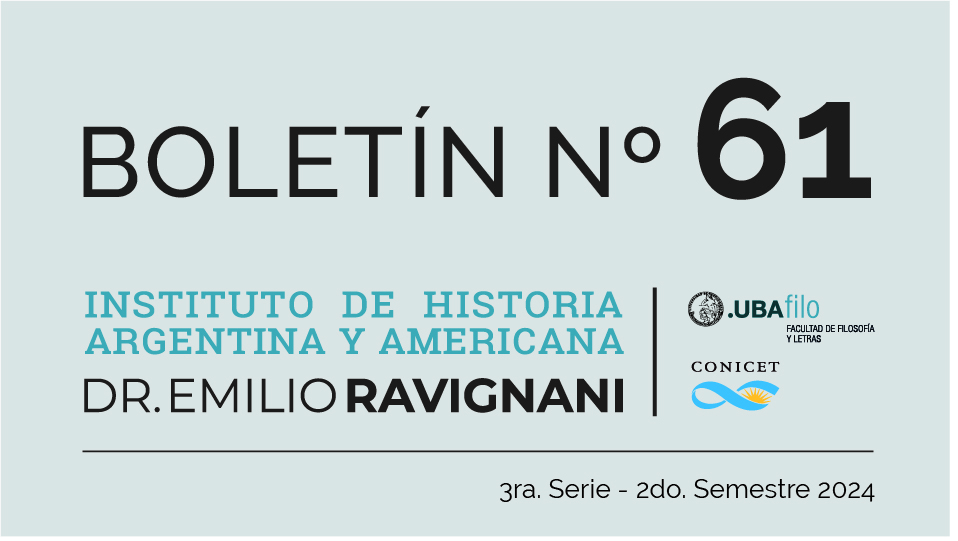'The harsh mechanism of empire' and its dissidents. On the decline of the colonial order
Abstract
This essay addresses a set of methodological problems around the study of the crisis of the colonial order and political history in response to the comments of Pablo Ortemberg, Gustavo Paz and Marcela Ternavasio on the book of my authorship, El poder del disenso. Cultura política urbana y crisis del gobierno español. Chuquisaca, 1777-1809.Downloads
References
Auster, P. (1996). La trilogía de Nueva York. Barcelona: Anagrama, p. 14.
Bowring, F. (2017). Hannah Arendt and the hierarchy of human activity. Times Literary Supplement, 7/9/2017 [Online] https://www.the-tls.co.uk/articles/hannah-arendt-hierarchy-human-activity/. La cita de Hannah Arendt (2005) en The Promise of Politics, New York, Schocken Books, p. 176.
Chartier, R. (1995). Espacio público y desacralización en el siglo XVIII. Los orígenes culturales de la Revolución Francesa. Barcelona: Gedisa, p. 14.
Christin, O. (2017). Vox Populi. Una historia del voto antes del sufragio universal. Buenos Aires: Paradigma Indicial, pp. 104-115.
Geertz, C. (2003). La interpretación de las culturas. Barcelona: Editorial Gedisa, p. 39.
Ginzburg, C. (1994). Microhistoria: dos o tres cosas que sé de ella. Manuscrits, Nº 12, p. 31.
Halperin Donghi, T. (1972). Revolución y guerra. Formación de una élite dirigente en la Argentina criolla. México: Siglo XXI.
James, C. L. R. (1963). The Black Jacobins: Toussaint L'Ouverture and the San Domingo Revolution. New York: Vintage Books.
Knight, A. (2004). Crítica de Eric Van Young, The Other Rebellion y la historiografía mexicana. Historia Mexicana, 54(2), pp. 450-451.
Levi, G. (1990). La herencia inmaterial. La historia de un exorcista piamontés del siglo XVII. Madrid: Nerea, p. 11.
Ortemberg, P. (2014). Rituales del Poder en Lima (1735-1828). De la Monarquía a la República. Lima: Pontificia Universidad Católica del Perú.
Ricketts, M., Posada-Carbó, E., Thibaud, C. y Hamnett, B. (2018). Book Forum. Imperial Collapse or Revolution? A Discussion of Brian R. Hamnett’s The End of Iberian Rule on the American Continent, 1770-1830. Journal of Early American History, 8, pp. 231-258.
Sartre, J-P. (1960). El hombre y las cosas. Buenos Aires: Editorial Losada, p. 57-58.
Serulnikov, S. (2022). El poder del disenso. Cultura política urbana y crisis del gobierno español. Chuquisaca, 1777-1809. Buenos Aires: Prometeo, p. 193.
Serulnikov, S. (2023). University Governance and the Culture of Dissent in Eighteenth-Century Charcas. Hispanic American Historical Review, 103(3), pp. 461-494.
Ternavasio, M. (2015). Candidata a la corona. La infanta Carlota Joaquina en el laberinto de las revoluciones hispanoamericanas. Buenos Aires: Siglo XXI.
Thibaud, C. (1997). La Academia Carolina de Charcas: una ‘escuela de dirigentes’ para la Independencia. En R. Barragán, D. Cajías y S. Qayum (Comps.), El siglo XIX. Bolivia y América Latina (p. 51). La Paz: Muela del Diablo Editores.
Tóibín, C. (2018). Desolation Row. The New York Review of Books, 5/4/2018 [Online] https://www.nybooks.com/articles/2018/04/05/federico-garcia-lorca-desolation-row/
Viotti da Costa, E. (1994). Crowns of Glory, Tears of Blood: The Demerara Slave Rebellion of 1823. New York: Oxford University Press.
Womack, J. (1969). Zapata y la Revolución Mexicana. México: Siglo XXI.
Copyright (c) 2024 Boletín del Instituto de Historia Argentina y Americana Dr. Emilio Ravignani

This work is licensed under a Creative Commons Attribution-NonCommercial 4.0 International License.
The copyright is transferred to the Boletín, but the authors may retrieve them and reproduce their work in other media or formats by means of a written request to the Editorial Committee. In such cases, the Boletín will be cited as the first publication of the work.
The works are licensed under a Creative Commons Attribution-NonCommercial 4.0 International License, which allows others to share the work with an acknowledgment of their authorship and initial publication in this journal.
Also, by written request to the Editorial Committee of the Boletín, the authors may separately establish additional agreements for the non-exclusive distribution of the version of the work published in this journal (for example, placing it in an institutional repository or publishing it in a book), with an acknowledgement of its initial publication here. No commercial uses are allowed.



















